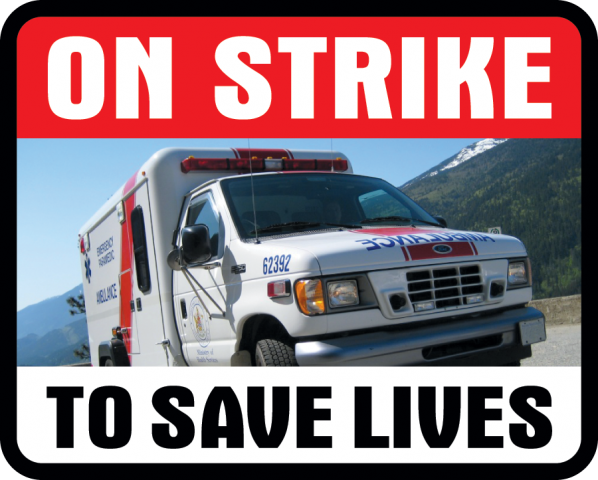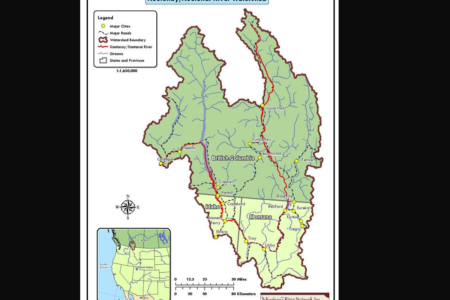Rossland Ambulance Service Suffering: BC Paramedics Strike Update
Unless you work with or around the paramedics in BC or have been in need of their services recently, you likely haven’t noticed the current BC paramedics’ strike apart from the signs posted around town.
The ongoing strike was launched by CUPE 873 (Paramedics Union) on April 1st of this year following the expiration of their previous deal on March 31st. The strike, now into its sixth month, has been sitting in limbo with no movement from either side since the union’s last offer was rejected by the BC Ambulance Service on June 19th.
This week I checked in with a few paramedics who wished to not be named as well as Corey Viala, the regional vice president for CUPE 873, based in Nelson, to get an update on the strike. Both the BC minister for Health Services and the BC Ambulance Services were contacted for this story but as of press time neither had responded to messages left.
Negotiations in the process of negotiating a new deal began as early as December of 2008 with the two sides going back and forth in a series of offers, rejections and various mediators in the process. Since the union’s latest offer was rejected on June 19th, there has been no formal contact between the two groups.
What the paramedics and CUPE are looking for in the deal boils down to wage increases in line with other essential services such as police and firefighters, stability in the form of a deal at least three years in length, and benefits for part time workers.
Part time workers and their wages/benefits are of most concern to the union, particularly in our area and other rural areas of BC.
“In my region, which is Region 4, which is everything between Midway and Golden,” explained Viala, “I would guesstimate that at least 85% is part time members. These people need to put in six years of service at least as part-time workers and then the next year up to a certain amount of hours before they get paid any kind of benefits whatsoever.”
This situation, along with the high costs involved in the required training has made recruitment and retention of skilled workers in rural areas such as Rossland difficult. Maintaining quality service without an adequate supply of skilled and trained paramedics leaves the quality and reliability of the service up in the air.
“Let’s say a young person in Rossland wants to do the training,” added Viala. “They will go out and spend anywhere between $10,000 and $15,000 to get their required P2P training. There are some bursaries and scholarships that they can apply for—between, I think, $3,000 and $5,000. Then they come back to Rossland to work. What happens when they work in Rossland however is that they only get two dollars an hour for pager pay. When they are on call they only get two dollars an hour to carry a pager. It means that they cannot be at another job or they have to have a lot of flexibility in their employer so that they can leave on a moment’s notice. Rossland is not a very busy station so you can imagine how many years it would take a part time worker in Rossland to gain back just the money they spent on their P2P training to get into that job.”
As Viala explained, this situation often leads to skilled and licensed paramedics being unable to pay off their training costs and make good wages to live on. In order to make a living, workers at rural stations like Rossland’s often leave for busier station in Kelowna, Penticton, or Vancouver.
“It’s a constant problem that we’ve been having in these areas and we want to address that in a new deal,” added Viala.
In recent years, paramedics have noticed a decline in the number of new recruits coming into the system and an increase in the number of trained staff leaving the system. Those part time employees who stay are more and more often looking to alternate jobs and devoting more time to other occupations to make a living, leaving them with less time available for the ambulance service.
“In our region, while I don’t have the numbers, we have a constant problem with ambulances being shut down because we don’t have enough staff to drive them,” said Viala.
The area covered by the Rossland station extends all the way out to Paulson Summit. If, as Viala points out, the Rossland ambulance is shut down for lack of staff, residents of Rossland would have to wait up to a half an hour longer for an ambulance to arrive from either Castlegar or Trail.
“They have two or three ambulances staffed in Trail and if all of those cars are out and busy and we have an incident in Rossland, it may take a half an hour or longer for an ambulance to get there. That makes a huge difference in service levels when we’re potentially talking life and death situations.”
Currently, the paramedics union under CUPE 873 have been pressing the BC Ambulance Service and the provincial government to get back to the bargaining table and make an agreement. Part of the reason the paramedics want to get a deal done as soon as they can is that they are unable to deliver any training to their new recruits under the current strike situation which is worsening their recruitment issues.
The other immediate need on the horizon is the 2010 Winter Olympics. The management (or mismanagement according to the union of ambulance service) of the Olympics, according to the union, is another sign of how low paramedics sit on the government’s priority list.
“The BC ambulance service and the provincial government have no plan in place for the Olympics,” explained Viala. “They want us to volunteer our time. Tell me if you think the Vancouver Fire department or RCMP are going to volunteer their time for the Olympics? Look at the big numbers they are spending on RCMP, something like $80 million? Their plan for us was for us to volunteer our services. When we said no to that, their response was to go across the country and ask all other paramedics in the country to come enjoy the party and volunteer for the Olympics. They left us in their own backyard out to dry. They don’t want to have to pay us for our services.”
Although the strike has been going on for six months now, ambulance service across BC has been maintained under and ESO or Essential Services Order by the provincial government. What this means on the ground is that the paramedics of BC are continuing to go to work and offer their services under the previous bargaining agreement, which officially terminated on March 31st.
The union firmly believes the provincial government has no motivation or desire to move the process along as the province continues to get their service under the previous deal’s rates.
“There is absolutely no motivation from the government to get a deal done. Period. Why would they? Right now they have us going to work every day, still offering the services. The longer the strike goes on the longer they get our service under the old deal. It’s a great situation for them: same service for the same [old] pay. Why would they want to negotiate with us under those terms?”
Viala is hopeful that in the next few days they will be able to nail down a meeting with the provincial government and the BC Ambulance Service to at least get back to the bargaining table. What the union would ideally like to see at this stage is to have a mediator put back in place to get both sides back at the table and at least discussing the issues.
Until that happens Viala notes that although the paramedics across the province are “frustrated and being burnt out,” over the current strike, they will continue to “bargain for the service of the people of BC. We are bargaining for a good service all across the province. All we ask for is recognition of our service and a deal that acknowledges our concerns around that.”


























